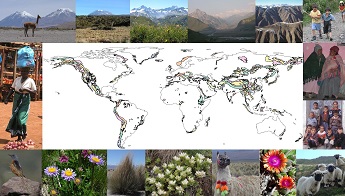Biodiversity-related opportunities for sustainable development in mountains
Developing effective valuation, policy, governance, and management approaches to safeguard the biodiversity underpinning human well-being in mountains and achieve international sustainable development goals requires a common understanding of the interactions between nature and people that are particular to mountains.
This working group supports inter- and transdisciplinary science in two main areas. The first is the nexus between biodiversity, ecosystem functions and services, and human well-being in the world’s mountains. The second is the importance of biodiversity in achieving the Aichi Biodiversity Targets of the Convention for Biological Diversity and the United Nations Sustainable Development Goals in mountains.
Objectives
Page under construction.
Deliverables
| Deliverable | Status | Lead |
|---|---|---|
Article: On nature and people in mountains: a comparative literature analysis reveals research opportunities |
Under review |
Davnah Payne |
Article: Toward biodiversity-related opportunities for sustainable development: a global social-ecological mountain comparison* |
Ongoing | Davnah Payne |
Project movie: Mountain biodiversity and the SDGs - intro to an R4D Project |
Completed |
Linus Neulinger |
Articles: N/A |
Ongoing |
Graham Prescott |
Coordinators
| Name | Affiliation | |
|---|---|---|
Graham Prescott |
University of Lausanne & Jardin Flore-Alp, Switzerland |
GMBA Network |
Tuyeni Mwampamba |
University of Mexico, Morelia Campus, Mexico |
GMBA SSC |
| Davnah Payne |
GMBA |
GMBA office |
Projects
Past project

Mountain biodiversity and sustainable development
This project will provide a global analysis and comparison of biodiversity-related opportunities for sustainable development in mountain ranges differing in their ecology and socio-economic situation.
Ongoing project
Mountain biodiversity and the Sustainable Development Goals: knowledge for synergistic action
This project provides policy-relevant knowledge towards opportunities for the sustainable management and conservation of mountain biodiversity (SDG15.4).
